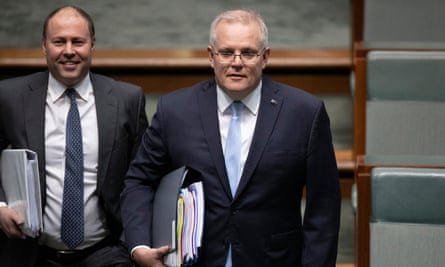Extract from The Guardian
Critics of Morrison’s tax cuts, including a Nobel laureate, have come out swinging with a new TV ad.

Last modified on Mon 21 Sep 2020 04.30 AEST
A television advertising campaign – endorsed by a former Reserve Bank governor, a former Liberal party leader and a Nobel laureate – opposing another round of tax cuts will be rolled out this week, as preparations are finalised for the looming October budget.
The Morrison government has already taken the decision to deliver tax cuts and unleash a new round of spending to stimulate the economy in the budget on 6 October. The prime minister hinted on Sunday that new support programs would be rolled out to support Australians once the jobkeeper and jobseeker payments were tapered at the end of September.
Given the budget will remain firmly in the red for the foreseeable future, treasurer Josh Frydenberg will lay out the government’s revised fiscal strategy in a major speech on Thursday.
Meanwhile, the progressive thinktank, the Australia Institute, is funding the new advertising campaign declaring that tax cuts won’t create jobs or pump prime the economy. The campaign is endorsed by former Reserve Bank governor Bernie Fraser, former Liberal leader John Hewson, Nobel laureate Peter Doherty, the chief executive of the Australian Council of Social Service, Cassandra Goldie, and a number of academic economists and former officials.
In statements endorsing the campaign, Fraser said: “The unfolding Covid pandemic is a stark reminder to all policymakers of two fundamental truths: that while many of us work and spend in economies, we all live and die in communities; and, secondly, the most vulnerable groups in those communities are always hit the hardest in major crises like this pandemic.”
Hewson said the government “naively” hoped that tax cuts are good politics, “but they won’t be as they increase inequality and fail to ensure job security and increasing wages with our economy still struggling to exit recession”.
Guardian Australia understands the government has already signed off on the big-ticket items for the looming budget, including tax cuts and infrastructure spending.
But while lining up the spending it will allocate after October, the government is also planning to cut income support through the jobkeeper wages subsidy and the jobseeker unemployment benefit at the end of the month, even though Victoria remains in a strict lockdown.
Some senior government figures accept that unemployment benefits need to be increased in perpetuity, because the pre-Covid Newstart payment was too low. But there is also concern that the current rate of jobseeker, which is effectively a doubling of Newstart, creates a disincentive to find work.
A report from Deloitte commissioned by Acoss says cutting the $550-a-fortnight coronavirus supplement would “harm the economic recovery and decrease both GDP and employment across Australia”.
Asked on Sunday whether Treasury had modelled the impact of cutting the income support payments on the economy, the prime minister said the budget would include measures picking up “from where others left off”.
Scott Morrison said the advice from Treasury was “we need to boost aggregate demand in our economy” and the budget would contain a full suite of measures “to do that job”. The measures are not more income support for individuals, but programs.
Asked whether unemployment had now peaked given new labour force data from the Australian Bureau of Statistics last week had been better than forecast, Morrison said it was hard to predict the future.
The ABS data showed that Australia’s employment rebounded with 111,000 more jobs in August compared with July, but more Victorians remained out of work due to the state’s second wave of Covid-19 and Melbourne’s stage-four lockdown.
Morrison told the ABC that more than 400,000 jobs would come back now that lockdowns were eased everywhere apart from Victoria.
“I think we’re going to see hundreds of thousands of more jobs come back in between now and Christmas, particularly, if we get this next step right in Victoria,” he said.
“Now, where the actual level of measured unemployment is by Christmas, it’s hard to say at the moment.”
No comments:
Post a Comment